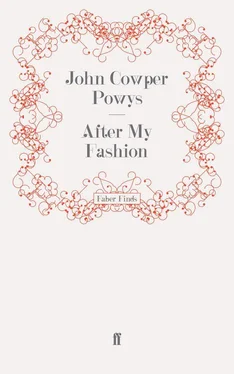Richard’s demons were abominably active at that moment. He permitted them to whisper terrible things. One of them accused the girl of sickening sentimentality, another of odious priggishness, a third of a pedantic arrogance that was unpardonable.
What does a chit of a thing like that think she can do for a man’s serious work? Young women with what they call ‘ideals’ ought to marry carpenters or bricklayers!
His mind took a long fantastic leap. Suppose I was fool enough to cut out this precious Canyot and carry her off. How should I like her sympathy? How should I like to feel her with her eye on me, helping me to be ‘my real self’? How should I like to be reminded of ‘humanity’s struggle’ when I was in my evil mood and loathed the whole farce? How should I like to have the ‘beaten ones’ called to my attention just when I was, for one lucky moment, able to forget that men had more nerves than animals? Nom de Dieu! she makes me feel as if my whole purpose, my great secret purpose, my very poetry, were some thin tender fragile thing that had to be pressed to a virgin’s breast — that had to be mothered! Bah! Let her go. Let her marry her jeering Canyot!
The accumulated howl of all his interior demons might have gone on still longer in this manner — for his fair-haired companion had fallen into a frowning disputation with herself — if his eyes had not chanced to be arrested once more by the lifted hands of the sleeping crusader.
It happened that a shaft of the bright afternoon sun, in its flickering passage across the aisles, had fallen upon these eternally praying hands, while it left the rest of the recumbent figure in shadow. It was the merest accident, the most casual chance; yet to Richard’s superstitious mind it seemed one of those omens of ambiguous decision, one of those auguries of warning, which he found himself always looking for as his life advanced; just as if he really did possess some ‘tutelary genius’, whose only permitted intercourse with him was through the dubious medium of such things as these.
A cloud passed across some distant window, and the light faded away; but an immense shame flooded the man’s whole being, and something awoke within him that made him look at her with a changed expression.
‘It is harder for me than you can believe,’ she began again, raising troubled eyes to his, as if conscious of his softening. ‘I can’t bear to make life more difficult for another person. It’s like pushing a child into the nettles instead of moving them out of the way. And I know I’m much more able to stand things going wrong than most people are. I’m awfully detached from my body, I think. It’s not any credit to me. I don’t seem really to mind what happens in that way.’
The poignancy of this, from a young creature at the threshold of life’s deepest revelation, struck Richard, in his new receptivity, as a heartbreaking thing.
The exquisite innocent! What did she know of the ache of mortal flesh? With a virginal body like hers, ‘detachment’ might indeed be easy! Between faint distaste for an intimacy she had no conception of and ideal respect for ‘art’ and ‘artists’ the struggle might very well be a light one.
Richard suddenly became conscious that there really were grave possibilities of tragedy here, such as, in his preoccupation with himself, he had not focused. Suppose she were to idealize him as she was evidently idealizing Canyot, would it be right for him — granting he cared for her more than just enormously — to carry her off and marry her?
The ‘eternally praying hands’ gave him no light upon this. He was left at the mercy of the now reawakening voices of the ‘eternally denying’ demons in his own heart: ‘Girls have to find out what life is like just as anyone else has’; ‘she gets her pleasure out of these self-sacrificing movements’; ‘she likes offering herself up on an altar’.
As these voices subsided, and the more normal Richard thought his own thoughts again, the temporary conclusion he came to was that it all depended upon whether she was really ‘in love’ or not. If she were not, it was an outrage, unjustifiable by any sophistry. If she were — well! it became quite a different matter.
One obstinate demon in him insisted, however, upon having the final word; ‘girls can mechanically become “in love” with the man they marry out of respect and admiration. The erotic automatism of the system of things drives them to that,’
‘I’m afraid we must go now,’ said Nelly Moreton, rising with a little shiver. She wanted at that moment to relieve both her muscles and her mind by a terrific stretch and yawn, but as respectable young women do not yawn and stretch in the aisles of cathedrals she could only give a jerk to her frock and a touch to the back of her head.
They took one last comprehensive glance round the great, cool, hushed place, in which they seemed at that moment isolated from all the world, and then emerged into outer sunshine.
Robert Canyot welcomed them with quite boisterous alacrity. He was tired of painting and anxious for tea and conversation.
He packed up his things and left them in the care of a friendly lodge-keeper at the gates of the close and together they wandered down the old narrow street enjoying the epicurean pleasure of a carefully considered discussion as to where they should have tea.
They passed by several attractive places as too crowded and decided at last upon a little modest confectioner’s which offered them a table in a bow window right against the street. Here they proceeded to make themselves thoroughly comfortable. The first cup and the first taste of thin bread and butter put them all into excellent spirits. Nelly, either in reaction from her troubled soliloquy, or out of some deep-buried feminine discovery, was as radiant and gay as a child; nor did the latent hostility of her companions cloud their response to her cheerfulness. They laughed and chatted and ate and drank hungrily, the men demanding boiled eggs in addition to the bread and butter, and the girl insisting upon the famous local honey.
It was not till quite the close of the meal that the smouldering antagonism between the painter and the writer began to reassert itself.
‘I suppose you get quite a lot of royalties from those books of yours? I seem to remember having seen them on bookstalls in town. They’re all about absinthe drinkers and cognac fiends, aren’t they — with illustrations of night life in the boulevards — the sort of thing Oscar Wilde used to tell us to read?’
‘They’re about the literature of France,’ answered Richard, keeping his temper with difficulty, ‘and my Life of Verlaine is certainly illustrated; but not all my authors have the weaknesses you speak of. Two very interesting ones are priests.’
‘They may be nuns, for all I should know,’ threw out Mr Canyot. ‘I daresay nuns, in France, compose literature like the rest. What puzzles me is how a sensible Englishman like yourself can waste time over such affected frippery. Come now — between ourselves — when it isn’t a matter of selling , don’t you think all this modern stuff — vers litre and so forth — is just tommy-rot?’
Richard was certain that he caught a direct appeal from Nelly that he should behave well under this attack. On the strength of an understanding with her he felt ready to be quite magnanimous. ‘I’m not prepared to defend anything en masse ,’ he said calmly. ‘But I think we’re bound to take a critical interest in every new experiment.’
‘Rats!’ responded the other, his great corrugated youthful countenance getting red with anger as he caught a sympathetic look pass between Richard and Nelly. ‘Rats! you know perfectly well that any genuine production is the result of three factors — skill, insight and inspiration. These people just flop and wallow around, and call their damned impertinence “genius”. We’re not by any means bound to take a critical interest in things which we know, by the smell, before we touch them, are thoroughly worthless!’
Читать дальше






